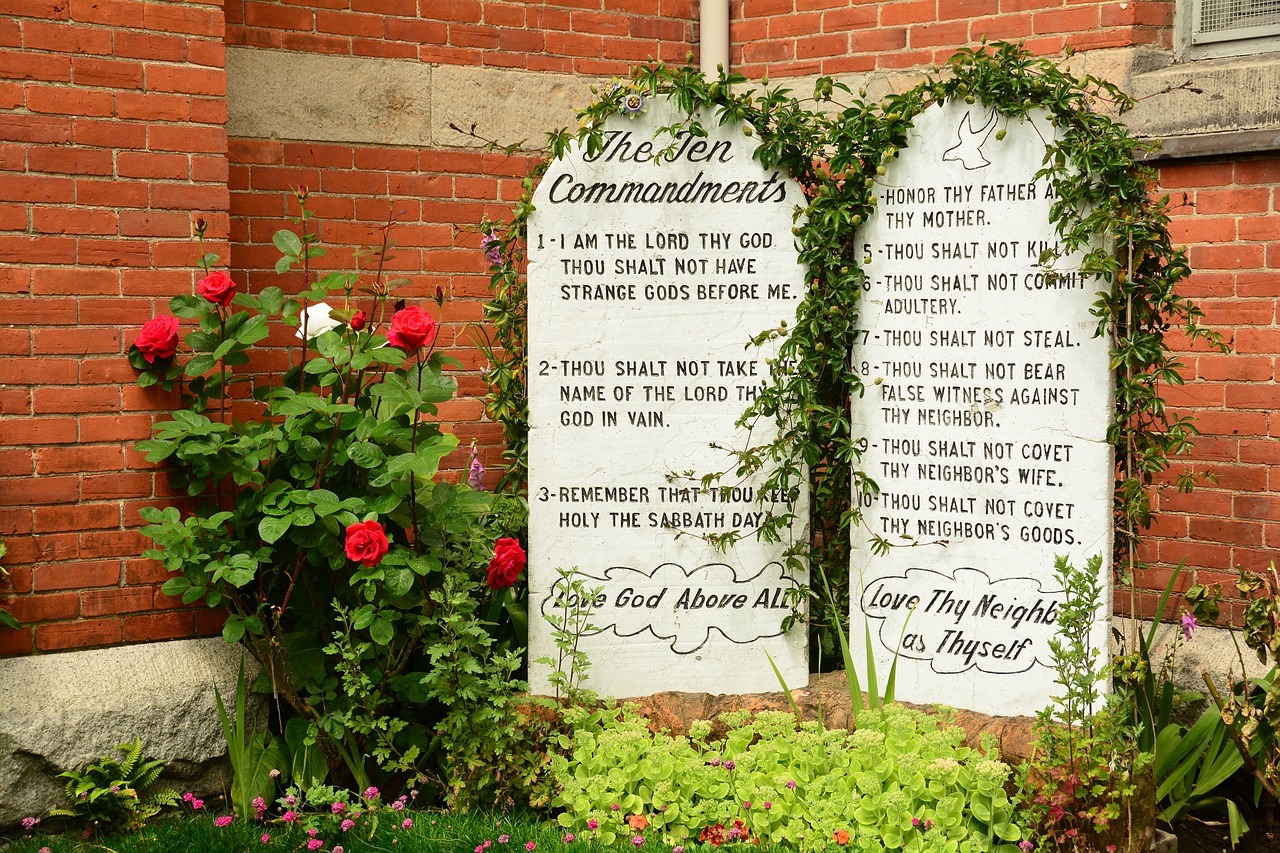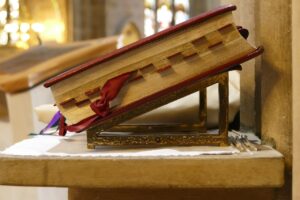Exodus 20: 1-17; Psalm 116 (RM) or 22 (RCL); Psalm 19; 1 Corinthians 1: 18, 22-25 (RM) or 18-25 (RCL); John 2: 13-25 (RM) or 18-22 (RCL).
An old friend and I were visiting her parents’ home, drinking coffee and chatting. Seemingly out of nowhere her mother, a former schoolteacher and an irascible type at the best of times, demanded to know, “What are the Ten Commandments? Tell me the Ten Commandments.” I recited some of them from memory, my friend added a few more, but we came up just short of ten. Her mother snorted, “What kind of theologians are you if you can’t say the Ten Commandments?”
I thought of this exchange later on while team-teaching confessional practice with a colleague at the seminary. He told the seminarians that if they noticed a penitent who appeared to be checklisting their sins into groups, that the person was in fact categorizing sins they had committed according to each of the Commandments, an old catechetical practice. He added that the confessor should be alert to signs of rigidity or shame in that penitent.
Why during Lent are we hearing the Exodus version of the Commandments? (There’s a slightly different version of the Commandments in Deuteronomy and yes, the numbering differs even between Protestant and Catholic versions so it’s possible not to get a consistent ten.) In Lent the Old Testament readings for Year B highlight the theme of the Covenant. Each of these stories – Noah for whom the rainbow symbolized a promise by God, Abraham who was “tested” as to whether he would sacrifice his son, this week the commandments and next week the Babylonian exile as punishment for the people’s infidelity – is fleshing out the historical context for the establishment of a new covenant in the death and resurrection of Christ, in Christian belief.
While the notion of a God who sets demands and expectations may seem off-putting, the positive side is that this deity is a living God in a dynamic interactive relation with humans in community. This God of Israel is no abstract concept, no idealized cosmic power. People can even reason with God, bargain with God …well, they can try.
But as often happens, when we peer more deeply into the underlying assumptions, nothing is as simple as it seems.
Let’s pose a prickly question: do the Ten Commandments apply to females? Or only to males? Are they imperative only for males and not for anyone else?
The injunction not to covet (the Hebrew implies “do not steal”) “your neighbour’s wife” is a dead giveaway. In a patriarchal, heteronormative society, only a husband would have a wife. Oddly enough, so is “do not commit adultery” because in that culture men’s adultery was largely tolerated unless the woman was married, which makes this more a question of property rights. On the other hand, honouring one’s father and mother does create a balance, in that even in a patriarchal society the criteria include not only gender but position and elder status. But is the commandment addressed to women?
Drorah O’Donnell Setel in The Women’s Bible Commentary 1992 writes,
“The commandments in Ex. 20: 1-17, considered to be at the very heart of both Jewish and Christian belief, state explicitly that it is a male community to whom they are addressed. In Hebrew the pronoun “you” is in a masculine singular form.”
O’Donnell Setel points out that in the preceding chapter,
“Nowhere is the secondary status of women and their exclusion from the central institution of Israelite society more apparent than in Ex. 19:15, where those who are preparing to enter the covenant with Yahweh are exhorted “do not go near a woman.”
Some readers may be thinking, “OK I’m done. I am totally done with this religion.” On the contrary, I find this kind of revelation exciting and encouraging, because once we have a better handle on the truth, we can begin to reform and reconstruct on a solid foundation to bring out the deeper underlying spirituality. If the fault lines and cracks are appearing, so are the healing and justice-making possibilities. “There is a crack in everything, that’s how the light gets in.”
Sadly my friend’s mother passed away some years ago. We could have had great fun telling her all that.
© Susan K. Roll
This Reflection has been revised from that of March 14, 2021.
Susan Roll retired from the Faculty of Theology at Saint Paul University, Ottawa, in 2018, where she served as Director of the Sophia Research Centre. Her research and publications are centred in the fields of liturgy, sacraments, and feminist theology. She holds a Ph.D. from the Catholic University of Leuven (Louvain), Belgium, and has been involved with international academic societies in liturgy and theology, as well as university chaplaincy, Indigenous ministry and church reform projects.





Thank you again Susan. In face of the documented (and mandated!) history of women’s invisibility, you choose a deep and wide lens, that makes: “this kind of revelation exciting and encouraging, because once we have a better handle on the truth, we can begin to reform and reconstruct on a solid foundation to bring out the deeper underlying spirituality.” May it be so!!